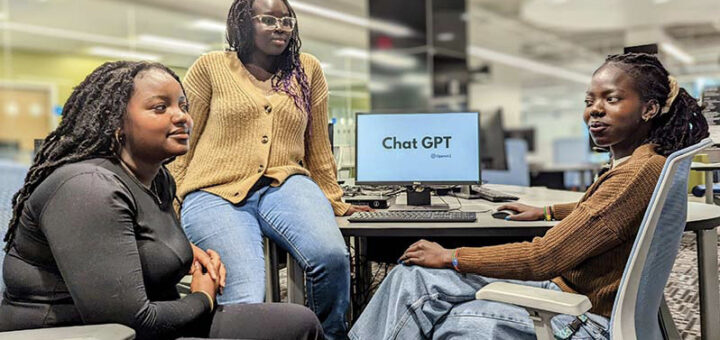MRU vs. AI: Is ChatGPT Taking Over Campus for Better or for Worse?

Arroy (AJ) Jacob, Contributor
“Robots are taking over the world” is a sentence others and I would only want to hear in sci-fi films, but amidst OpenAI’s launch of ChatGPT, many now believe this story trope is becoming our reality.
ChatGPT is OpenAI’s most controversial large language model (LLM), established in late November 2022. Its controversy lies in its ability to crunch out complex prose or answers to your calculus homework through chatbot conversation.
The LLM is most infamous for its use in post-secondary institutions like Mount Royal University (MRU). Many know of its power to generate well-written essays that students plagiarize.
But amidst the splurge of fears over ChatGPT’s “copycatting,” many MRU professors seem to think otherwise. In terms of its application in the classrooms, according to a continuously updated article on the MRU Library website, “Artificial Intelligence” written in collaboration with the Academic Development Centre (ADC) and Student Learning Services.
There is a subtle clash present. And determining whether or not “robots are taking over the world” comes from an open discussion of its faults and opportunities.
Its faults
“So they’re just handing in an assignment, but they’re not the ones doing the work? They just understand what the AI wrote?” asks “Mona,” an MRU Bachelor of Social Work student wondering how her classmates might be misusing the online tool. Mona believes it would be more detrimental than impactful for their academic endeavours.
ChatGPT can also write creatively, so I spoke with Brennan Kenneth Brown, president of the Mount Royal Write Club, who says, “I have been witnessing the steady progress of artificial intelligence since I was a child, and now, still a layman now, I see the singularity ahead in front of all of us. It looks different than what most science fiction writers have imagined.”
Brown has experience with both creative writing and evolving technology. And hearing his response as a creative writer myself reflected much of the general grief MRU student writers experience.
“Will AI help students? In the short-term, sure. It already is…The ability to tell the difference between a human’s creation and an AI’s creation will soon become an impossibility,” Brown adds.
Its opportunities
No shadow can exist without light, and with grievances lies opportunities, according to some MRU professors.
Dr. Natalie Meisner, a professor of English and former poet laureate of Calgary, discussed why she may not consider the LLM a threat. “Since AI is scraping data from the internet, it can tend to partake in some of the unfortunate tendencies of internet culture [we agreed upon the term ‘troll-art’].”
According to Meisner, for student writers, at least, “AI can make plays, poems, and stories; [but] they [just] aren’t good. They partake of the worst tendencies of the internet (racist, sexist, homophobic and tone-deaf tropes) so we won’t be out of a job any time soon.”
As mentioned previously, the “Artificial Intelligence” article posted by the Riddell Library and Learning Centre was written partially in collaboration with the ADC. I later spoke with Dr. Christian Cook, professor of Human Resources and academic director for the ADC, one of many faculty handling AI in the classroom.
Cook mentions it’s important to note that, “the K-12 system has tried to ban [ChatGPT]. We’re not taking that approach.”
“I think that whether or not [ChatGPT] is or isn’t academic misconduct… lies in the agreement that the instructor makes with students. If an instructor has said you can’t use [ChatGPT], and someone does, I think that integrity’s been compromised. If somebody says, ‘use any resources at your disposal, use ChatGPT, use your mom’s friend, use some lady you found in the ADC,’ then maybe that’s a different story,” Cook adds.
When asked if the ADC would assist in facilitating workshops highlighting the use of ChatGPT and its embrace, Dr. Cook says, “we have one where the focus is more around academic integrity, and we have another that is an exchange of what people say.”
Chris Rogerson, the executive director of student affairs, says that while ChatGPT has garnered some media attention, so have programs that combat academic dishonesty.
“MRU is astutely aware of the variety of tools … that [students may use] to inappropriately gain academic advantage for work that is not their own, and ChatGPT is just one.”
Despite all these differing opinions, we all agree upon two things. ChatGPT has an evolving power, and it’s not going away anytime soon. To innovate and adapt to this ever-changing technology, an open discussion among students and faculty is always a good place to start.
And whether or not this article was written by me or a robot is up for you to decide.




